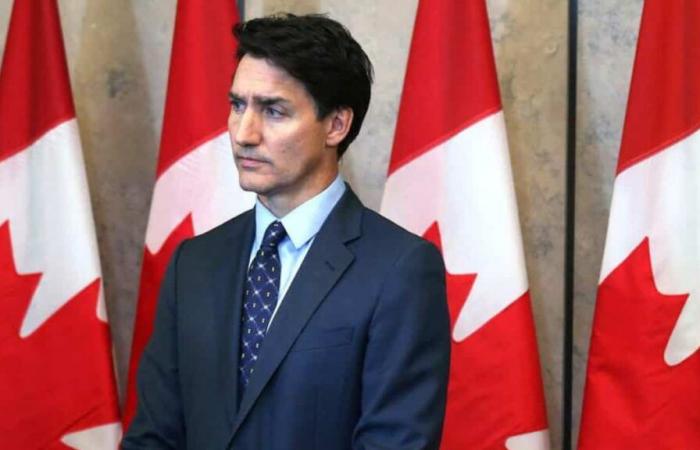The last few months have been very difficult for Justin Trudeau. The resignations of party leaders, the disastrous polls as well as the successive defeats suffered by the Liberal troops in numerous by-elections got the better of the leadership of the Canadian Prime Minister who resigned on Monday.
• Also read: LIVE | Justin Trudeau leaves leadership of the Liberal Party of Canada
• Also read: Justin Trudeau’s resignation ‘changes nothing,’ says Pierre Poilievre
• Also read: Resignation of Trudeau: elected officials underline his “dedication”
Justin Trudeau has left the leadership of the Liberal Party of Canada, but will remain prime minister until his successor is chosen, he announced in a press briefing in front of his residence in Ottawa on Monday.
“I intend to resign as leader of the Liberal Party of Canada and as Prime Minister once the party has chosen its next leader following a national, rigorous and competitive process,” he said. he declared.
What benefits did the Canadian population reap at the end of these nine years of reign?
Here are five good moves from Justin Trudeau.
1. Legalization of cannabis
Justin Trudeau’s rise to power in 2015 was marked by the promise of change. His plan to legalize cannabis, which went against the grain of the prohibitionist policies of the governments that preceded him, was one of the measures that caused the most ink to flow during his electoral campaign. The initiative made Canada the first major industrialized country to provide legal and regulated access to cannabis for non-medicinal purposes.
Legalized since 2018, recreational cannabis is the subject of near consensus among the Canadian population, despite the numerous reservations expressed by the various public health agencies. Indeed, if cannabis consumption was constantly increasing in the 30 years preceding its legalization, it has exploded since the substance became more accessible, increasing it from 14.8% in 2017 to 22% in 2021.
• Also read: Death of Elizabeth II, apology to Indigenous people: 5 times Justin Trudeau cried
Points of sale have since mushroomed all over the country. The cannabis sector showed a steady increase from October 2018 to December 2022, but began to decline in 2023. The cannabis sector was valued at $10.8 billion in 2023, representing an increase from its value of $6.4 billion at the time of its legalization.
Cannabis offenses have decreased since legalization, and approximately 68% of Canadians now obtain their cannabis legally.
Former federal MP for La Prairie Jean-Claude Poissant and analyst Stéphanie Tougas comment on Justin Trudeau’s resignation on Benoit Dutrizac’s microphone, on QUB, broadcast on 99.5 FM
2. Canada child benefit
Introduced in the 2016 federal budget, the Canada Child Benefit (CCB) provides more money to Canadian families to help them cover the costs of raising their children. It also provides additional amounts for families who have children with severe disabilities.
This tax-free benefit is determined based on the number of eligible dependent children, their age and the net family income of a household. In 2022, 3.5 million families received the CCB, the University of Sherbrooke said in a report.
According to the Liberal Party of Canada platform, it helped lift 435,000 families out of poverty.
3. Daycares at $10 per day
The creation of daycare spaces at $10 per day across the country, announced in April 2021, made it possible to reduce the fees paid by parents to send their children to daycare.
According to Canadian government data, service fees have been reduced by at least 50% in the country before the end of 2022, and the rate imposed on households should reach $10 by 2026.
In a majority of Canadian provinces, the rate of $10 per day has been applied, which allows families to save up to $14,300 per year in childcare costs.
Agreements concluded between 2017 and 2020 enabled the creation of 40,000 affordable daycare spaces across the country and this number is expected to reach 250,000 spaces by 2026.
4. Renegotiation of NAFTA
The Canada-United States-Mexico Agreement (CUSMA), which is a revised version of the North American Free Trade Agreement (NAFTA), retained much of the content of NAFTA at the end of a long negotiation with the first administration of Donald Trump.
For the first time, it includes chapters on labor, the environment, small and medium-sized enterprises and the digital market.
The signing of the agreement ended a tariff war with the United States, which had imposed customs duties on Canadian steel and aluminum.
5. COVID-19 Vaccination and the Canada Emergency Response Benefit
The Trudeau government had to face the worst crisis of the century by having to manage the COVID-19 pandemic. Faced with business closures, Ottawa launched the Canadian Emergency Response Benefit (CERB), which allowed many workers directly affected by COVID-19 to receive $2,000 per month while waiting for the economy to reopen.
According to the Canadian Center for Policy Alternatives, obtaining the CERB was a positive experience for a majority of beneficiaries, because it allowed them to have a certain financial stability during a period marked by uncertainty. This inflow of money also allowed them to have the time necessary to consider additional training, skills development as well as to open up to other professional possibilities.
In fact, 40% of providers took advantage of this downtime to follow training. The CERB also helped its beneficiaries return to the workforce, as 66% of them said the benefits allowed them to re-enter the job market in a way that better suited their needs.
Canada has also been very proactive in vaccinating against COVID-19. The campaign, which launched in 2021, enabled a majority of Canadians to become immunized against the disease. The Liberal Party of Canada indicated that it had achieved its objectives two months ahead of the deadline it had set.






